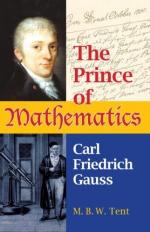|
This section contains 655 words (approx. 3 pages at 300 words per page) |

|
1777-1855
German Mathematician and Astronomer
Carl Friedrich Gauss holds a place among history's greatest geniuses, such as Sir Isaac Newton (1642-1727) or Albert Einstein (1879-1955). He advanced number theory with his formulation of the complex-number system; laid the groundwork for modern probability theory, topology, and vector analysis; and, like a few other mathematicians of his day, contributed extensively to the knowledge of astronomy. Gauss is also credited with the invention of a trigonometric measuring device called the heliotrope as well as the bifilar magnetometer and a prototype for the electric telegraph. This interrelation between mathematics and science and the applications of both were central to the worldview of Gauss, who saw mathematics itself as a science.
Gauss's story is particularly intriguing given the fact that he was born into a humble family; his father, Gebhard, was a laborer and merchant and his mother, Dorothea...
|
This section contains 655 words (approx. 3 pages at 300 words per page) |

|


